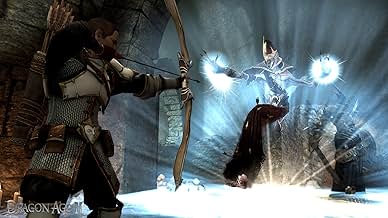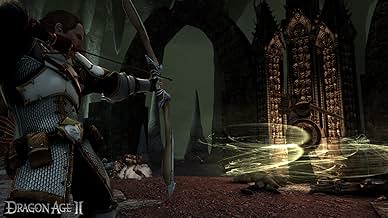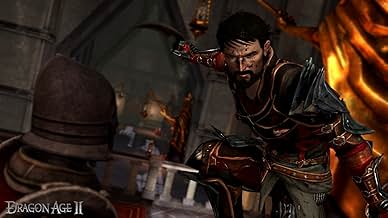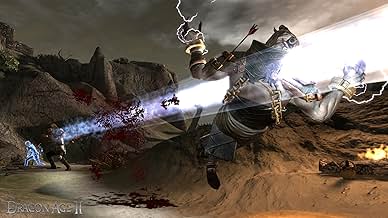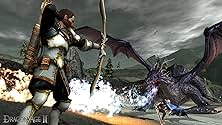Agrega una trama en tu idiomaThe medieval world of Thedas is invaded by demonic Darkspawn. Hawke and his family are saved by a powerful mysterious witch Flemeth. They end up in a foreign city where racial, religious and... Leer todoThe medieval world of Thedas is invaded by demonic Darkspawn. Hawke and his family are saved by a powerful mysterious witch Flemeth. They end up in a foreign city where racial, religious and political tensions threaten to tear it apart.The medieval world of Thedas is invaded by demonic Darkspawn. Hawke and his family are saved by a powerful mysterious witch Flemeth. They end up in a foreign city where racial, religious and political tensions threaten to tear it apart.
- Dirección
- Guionistas
- Elenco
- Premios
- 4 nominaciones en total
- Anders
- (voz)
- …
- Carver Hawke
- (voz)
- …
- Fenris
- (voz)
- …
- Keran
- (voz)
- …
- Viveka
- (voz)
- …
Opiniones destacadas
Varric, in particular, stands out as one of my all-time favorite characters. His wit, loyalty, and charm make him the ultimate companion, and I find myself taking him everywhere in the game. Whether he's offering humorous commentary or heartfelt advice, Varric is the kind of friend you want by your side, both in and out of battle.
Another aspect I adored was how the game tied itself to its predecessor. Some characters you meet in this installment make direct callbacks to the events of the first game, and those moments are nothing short of fantastic. They not only reward long-time players but also create a deep sense of continuity and immersion. The ability to import choices from the previous game was groundbreaking for me, as it made the world feel alive and reactive to the decisions I had made before. Few games at the time offered this level of interconnectivity, and it was an experience that felt truly personal and unique.
The combination of an emotionally gripping story, unforgettable characters, and the way the game respected and built upon your previous choices is what makes this installment so special. It's a game that stays with you long after the credits roll, and even years later, I find myself revisiting it to relive the magic all over again.
With that said, I have some major gripes with DA2. First, you don't have control over your party members armor. This drives me nuts, and I find this change from the first game inexplicable. Second, and much more confusing is that the world is significantly smaller than Origins. In Origins, you explored a continent filled with castles, caves, mountains, villages, and cities and tunnels under the Earth. The world was diverse and rich with life and history. In DA2, the entire game is in the city of Kirkwall and a few surrounding areas. Third, and the most irritating, is that the game designers reuse the same areas over and over and over. When I found myself in the brothel and then later a noble's house, and they had exactly the same rooms with the same layout, it made me want to punch the game. Not to mention, that you enter 15 different caves, and each cave is simply the same set piece being reused constantly. On top of that, you find yourself running around the same parts of Kirkwall over and over and over and over and over. Thank God that the quests have quite a bit of variety, but at the same time, I found myself wanting a centralized interested story to keep the game moving. Hawke is a fun character, and his/her voice acting is terrific, but again the game finds itself wanting in the plot department. Also, all of the supporting characters are well-developed and easy to care about.
Overall, the game is very well-made. Most of its faults come from comparing it to the first, which again, was a much better game. I expected this game to be an 11/10, but sadly it falls somewhere closer to an 8/10. I will continue to play Dragon Age games, but unfortunately this game put a damper on that desire.
Is it as good as the first one? Nope. As open as the third? Nope. Is it short? For an RPG, yes. Are the maps recycled? Oh yes, I would call this the most deserved complaint of the game.
On the other hand, it has a decent plot (especially if you read the accompanying books), genuinely wonderful, well written companion characters ranging from adorable, to charming, to absolute anti-hero, a customisable protagonist who you can play in multiple ways (think Commander Shepard only with the addition of a third snark-master playstyle alongside paragon and renegade), the voice acting is fantastic, really engaging and actually pretty star-studded to be fair, it isn't long enough to get overly grindy, the graphics are dated now but their cartoonish style tends to fit well with the overall tone, the battle system is fast paced and has a fair amount of variety in difficulty depending on your settings, but most of all the whole thing is just *fun*. It hearkens back to the days when games didn't pretend to be sports or services - when they were immersion into a different world (and no teenagers claimed to have had relations with your mother), when they did dare to be a bit silly but still knew when to reign it in when the action got going. Honestly - if you've never played it don't be put off by all the negativity, just give it a go. Yeah buying it at full price (plus DLCs) when it was new only to find out that you could finish it in a week was annoying, but it's only about a tenner now for the whole lot, what's to lose?
Anyways, I was absolutely obsessed with Dragon Age: Origins. The rich and epic storyline, emotional depth and involvement of the characters, along with the fantasy-RPG format and gameplay really captivated me to the point that I actually played through the game three times, with the expansion (Awakening) and all the DLC.
How does Dragon Age II compare? They changed aspects that I could see many taking issue with in the first game, such as the combat not being fast-paced enough, and seeming lack of consideration in creating a compelling visual representation of the Qunari.
The combat in DA II is much more fast-paced, and difficulty levels are maintained, and the Qunari are brilliantly depicted as their menacing selves. These changes I can agree with.
What I take issue with is the significantly weaker storyline and limited itemization and customizing options in comparison to DA: Origins. I rather enjoyed being able to meticulously equip and train all of my companions. It is replaced by a general upgrading system that is based on finding character-specific items that party members will automatically add to their existing attire. Accessory items are still interchangeable, but I feel that change was detrimental to the experience.
I realize that consistent itemization is a lot of complicated work for developers, and DA: Awakening suffered slightly in that respect, however I am always against limiting the power of the player when it comes to RPGs.
On the subject of DA: Awakening, the changes to the Runecrafting system for DA II was very welcome. I do not miss the hours spent upgrading runes to fill my equipment.
Concerning the use of characters in DA II, I feel was not bold enough. It seems that attempts were made to present difficult dilemmas for the player to choose from. However, since very few of the characters are even likable, almost all of the decisions were in fact easy to make, or rendered moot. This is likely due to the apparent lack of camaraderie between the central character and his/her companions that was present in DA: Origins, combined with the dialogue of DA II that appeals more to emo subculture than the vast majority of teens and young adults that play fantasy RPGs, and a lack of comic relief in an apparent struggle that seems more commonplace than a time of crisis.
There is an exception to the absence of comic relief in the character Merill, whose neurotic and often clumsy dialogue is a source of entertainment. Also, a couple of short encounters with characters from DA:O were entertaining while they lasted. However, generally the characters are much more severe in DA II than DA:O, when the conflicts and crisis of DA II do not feel as urgent.
I use DA:O and Awakening as a reference point to assess the direction of DA II because, in my opinion, DA II does not function on its own. It requires an understanding of DA:O to assess the successes and apparent failures of DA II.
Having finished both games, I highly recommend that prospective buyers play and finish Dragon Age: Origins, before playing Dragon Age II. If you don't play DA:O, I cannot guarantee that the context of DA II will be totally clear. If you did not like DA:O, you still might like DA II. If you loved DA:O, you won't be as enthused by DA II as you were the first game. It is still a solid fantasy RPG.
8/10. This would be an easy 9 or even 10 if a better effort was made towards the storyline, character development, dynamics between characters, dialogue, and companion itemization. The score is only so high because I believe in giving sequels a fair shake as a standalone item. If I was rating based on my comparisons to DA:O, I would have given it a 6 or 7.
¿Sabías que…?
- TriviaIn Act 1, if you talk to the bartender at The Hanged Man then he may say something about the rapid decline in the pigeon population in Ferelden. This is a reference to Shale from Dragon Age: Origins.
- Citas
Isabela: I spy with my little eye, something that is... red. And socially uncomfortable.
Aveline Vallen: Ugh.
Isabela: No guesses? It starts with A.
Aveline Vallen: Shut up.
Isabela: Ooh, my mistake. It starts with such a B.
Aveline Vallen: Time and a place, Isabela. No games when we're this deep in a mess.
Isabela: Fine. Gone from B to a real C, anyway.
- ConexionesFeatured in Sage Reviews: Dragon Age II (2011)
- Bandas sonorasDestiny Of Love
By Inon Zur, Idan Reichel, Aubrey Ashburn (as Olivia Orr)
Performed by Aubrey Ashburn (as Olivia Orr)
Selecciones populares
Detalles
- Color




